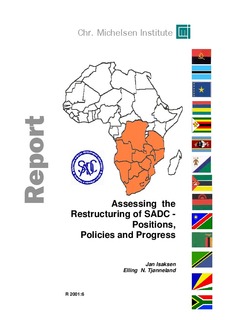Assessing the Restructuring of SADC - Positions, Policies and Progress
Research report
Permanent lenke
http://hdl.handle.net/11250/2435903Utgivelsesdato
2001Metadata
Vis full innførselSamlinger
- Bora-import [434]
Sammendrag
This study was commissioned by Norad. The Report provides an assessment of the institutional restructuring of SADC and an input to the planning of future Norwegian assistance to regional co-operation in Southern Africa.The institutional reforms mainly revolve around the changing role and functions of the SADC Secretariat but also include the sector co-ordinating units in member states which have been found highly uneven in their ability to pursue and implement policies; the establishment of SADC National Committees in member countries; greater emphasis on the role of non-state actors; a SADC Organ on Politics, Defence and Security which became part of the SADC structure; and the preparation of a Regional Indicative Strategic Development Plan (RISDP) intended to make SADC’s objectives more operational. The report finds the reforms major and significant steps to address the weaknesses associated with the old SADC structure.It is found significant that SADC has managed to make progress in several policy areas despite political divisions in the Southern African region. Looking at the future, the report concludes that it will be important to ensure that all member countries benefit from the membership to some degree; points out that regional integration will not succeed only on perceptions of economic costs and benefits in individual member countries but also depends on political will and commitment; argues that the RISDP is extremely important for the future success in delivery and creation of a common understanding of SADC’s role; emphasises South Africa’s crucial role in advancing regional co-operation; and finds that overlapping regional integration efforts in Southern Africa, like the relation between SADC and Comesa, may become more problematic with the move to economic integration. SADC should not be expected to make rapid progress in implementation and delivery in the short run. Progress will rather be an incremental process that will require time and astute management.Norway must be prepared for continued flexibility and shortterm assistance in its support, and build capacity for monitoring and analysis. In the medium to long-term, Norwegian support should focus on SADC’s core areas of operations. Norway should follow closely SADC’s efforts to facilitate conflict resolution and political stability and, in its assistance to individual SADC member countries, support projects and programmes that enable the countries to benefit from regional co-operation.
Utgiver
Chr. Michelsen InstituteSerie
Research reportR 2001: 6
